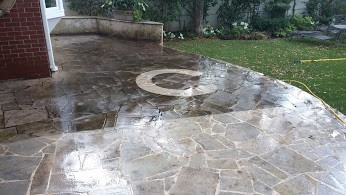Both power washers and pressure washers use high pressure and a water spray for washing concrete, asphalt, masonry, wood, buildings, siding and other surfaces. Due to the high pressure, both pressure and power washers can remove dirt, mold, loose paint, mud, grime and many other types of debris fairly easily.
The main difference is that power washers will allow you to use heated water, while pressure washers won’t. As a result, power washers can tackle many additional types of cleaning jobs. Both types of washers will let you add soap or cleaning agents.
What Can You Clean With a Power Washer?
A power washer is ideal for heavy-duty cleaning on surfaces that can handle the added heat. You can use your power washer for:
- Large driveways: While a power-wash for your driveway is
not ideal for concrete, if the surface can handle the temperature, it’s the right choice. A power wash for your driveway can make cleaning a large surface area relatively easy.
- Organic debris: If you have an area with weeds, moss, mold, grease or caked-on mud, the heat from a power wash can help loosen what would be tough to clean by hand. If you have mold, moss or anything that tends to grow back, hot water and soap in a power washer can kill these types of buildup, making it harder for the issue to return.
- Hard surfaces: Power washers are ideal for larger, stronger surfaces that can stand the heat. In general, test the washer on a small, inconspicuous spot first to make sure it won’t cause damage.
What Can I Clean With a Pressure Washer?
Pressure washers are best for surfaces that hot water can damage. While you can power wash concrete, for example, hot water is not always the best choice. A pressure washer can be a better option for cleaning brick, masonry and concrete.
Delicate surfaces are best served by pressure washers. While you can power wash patio furniture, for example, unless the items are very sturdy, a pressure washer with soap may be your best option.
A pressure washer is ideal for smaller areas and small patios, decks and walkways. It’s also the gentler choice for your home’s siding and for wood surfaces and tile as well as any other surfaces that could be damaged by heat.
More Tips for Pressure and Power Washing
You should not power wash or pressure wash anything delicate, including painted surfaces, sandstone, older surfaces, asphalt and stained wood. Professional cleaners have the nozzles and know-how to clean some of these surfaces with pressure washers, but it’s certainly not something to attempt unless you’re an expert.
You have a variety of choices when it comes to cleaners. Always read the directions and test the product on a small area. Harsh cleaners can cause as much damage as hot or pressurized water.
Why Hire a Professional for Power and Pressure Washing?
While you can buy your own power washer and pressure washer, professional power washing services use professional-grade washers and cleaning agents that can remove even more debris. If you have tough grime that even your own pressure or power washer can’t touch, professionals cleaners like the ones at Cyclone Professional Cleaners can help. The experts at Cyclone Professional Cleaners also have the know-how to clean your home properly without causing damage.
It can also be safer to leave it to the pros. Both pressure and power washers have a lot of force and can cause injury when they’re not used correctly. Power washers can cause burns, and both types of washers can cause hearing damage if you’re not careful. Working with Cyclone Professional Cleaners will remove all the risk from you and ensure a good result, so why not get a quote from Cyclone Professional Cleaners today?



 not ideal for concrete, if the surface can handle the temperature, it’s the right choice. A power wash for your driveway can make cleaning a large surface area relatively easy.
not ideal for concrete, if the surface can handle the temperature, it’s the right choice. A power wash for your driveway can make cleaning a large surface area relatively easy.